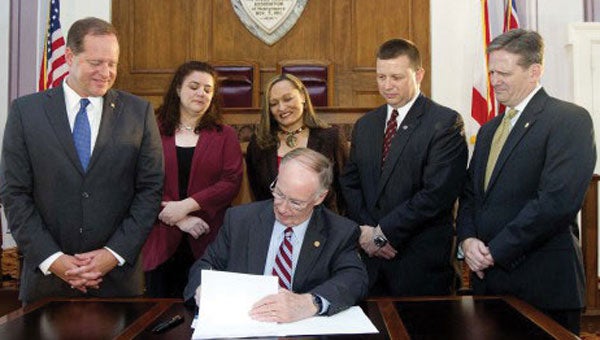Jones: Years from now, we’ll realize how big this is
Published 9:17 pm Thursday, May 21, 2015

Alabama Gov. Robert Bentley ceremonially signs SB 67 into law at the state Capitol in Montgomery, Thursday.The historic criminal justice reform bill was sponsored by state Sen. Cam Ward, left, and state Rep. Mike Jones, second from right. Also pictured are Corrections Commissioner Jeff Dunn, right, and state Sen. Vivian Figures, behind Gov. Bentley. The bill is designed to significantly reduce the state’s prison population and bolster public safety through an overhaul of how people are supervised after being released from incarceration. (Governor’s Office, Jamie Martin)
Years down the road, Alabama’s leaders will look back and how important Thursday’s signing of a comprehensive criminal justice reform bill was, Rep. Mike Jones, R-Andalusia, said.
Jones sponsored the legislation in the House, where he serves as chair of the Judiciary Committtee. Sen. Cam Ward, R-Alabaster, was the Senate sponsor of the legislation Gov. Robert Bentley signed into law yesterday.
The reforms are designed to significantly reduce the state’s prison population and bolster public safety through an overhaul of how people are supervised after being released from incarceration.
Bentley said the bill will cut the state’s overcrowded prison population by more than 4,200 people, avert more than $380 million in future costs and provide supervision for 3,000 more people upon release from prison.
The bill includes policies to strengthen community-based supervision, prioritize prison space for people convicted of violent and dangerous crimes, and promote evidence-based services and treatment for people receiving supervision in the community. When fully implemented, the legislation is projected to reduce the number of people in correctional facilities by 16 percent and avert more than $380 million in costs associated with expanding prison space over the next six years.
Jones told those gathered for Thursday’s ceremonial signing that as he reflected on the occasion, responsibility was the word that most came to mind.
“As a state, as a legislature, the governor, everybody involved in this process – Republicans, Democrats – every stakeholder along the line realized what had to be done and took responsibility,” Jones said. “That’s what it took.
“That’s why the vote in the House was 100-5. The vote in the Senate for concurrence was 27-0. Those numbers that frankly don’t happen all the time, but they speak volumes about how important this issue is.
Other highlights of SB67 include:
• Diverting people convicted of low-level property and drug offenses away from prison;
• Strengthening supervision through promotion of evidence-based practices, and establishing criteria for how parole decisions are made;
• Completing an electronic victim notification system begun in 2012 and expanding notification to victims regarding individuals who are released from prison.
The framework was developed with support from the Council of State Governments (CSG) Justice Center, which has provided data-driven analyses and policy options to state leaders in 21 states to date, in partnership with The Pew Charitable Trusts and the U.S. Department of Justice’s Bureau of Justice Assistance.





